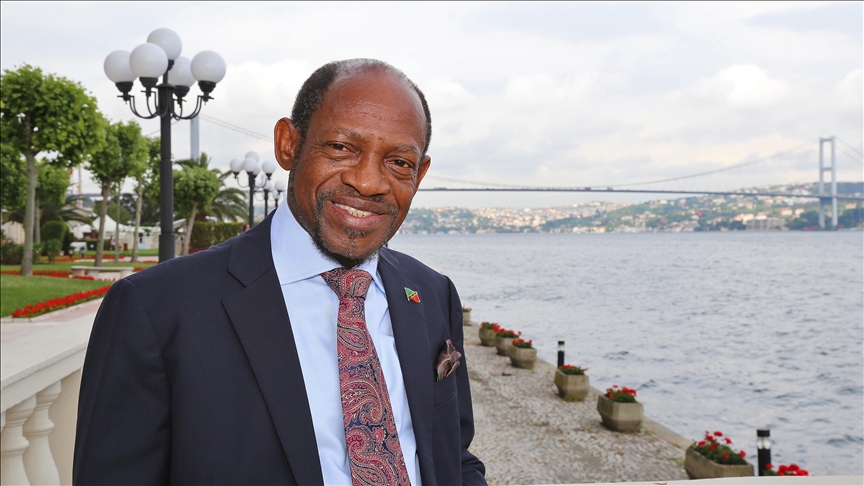'If we are to survive': Saint Kitts and Nevis urges international climate solidarity
'Let us transition from our dependence on fossil fuel energy to sustainable energy means. Let us explore the geothermal capacity ... Let us explore those possibilities,' Kittitian Nevisian Foreign Minister Denzil Douglas tells Anadolu
 Saint Kitts & Nevis Foreign Minister Denzil Douglas
Saint Kitts & Nevis Foreign Minister Denzil Douglas
- Douglas underlines need for dialogue as conflicts and tensions worldwide impact countries, resulting in 'disruption in supply chains, the shortages of important products that we are accustomed to using as part of our normal development'
ANTALYA, Türkiye
As rising seas erode shorelines, droughts parch farmland, and hurricanes threaten to wipe out entire communities across the Caribbean, the region stands at the frontlines of the global climate crisis, experiencing some of its most severe and immediate impacts.
Made up largely of Small Island Developing States, the region faces a combination of climate-related challenges, from food and water insecurity to infrastructure risks and economic volatility. One of the countries trying to manage these pressures is Saint Kitts and Nevis, a two-island nation in the West Indies that is the smallest sovereign state by both area and population in the Western Hemisphere.
Foreign Minister Denzil Douglas says his country is feeling the impacts of climate change across every sector, and is seeking international support to accelerate the transition to clean energy and climate-resilient infrastructure.
“Let us transition from our dependence on fossil fuel energy to sustainable energy means. Let us explore the geothermal capacity that we have in the sister island of Nevis, of Saint Kitts and Nevis. Let us explore those possibilities,” Douglas told Anadolu.
Energy, water, and food
Like many of its Caribbean neighbors, Saint Kitts and Nevis is at the frontlines of a crisis it did little to cause. Studies show that climate change is already reducing freshwater supplies, damaging crops and livestock, and eroding coastlines.
In a country where rainfall is the only source of potable water, worsening droughts and soil degradation are driving up food insecurity and reliance on imports.
Douglas, who served as his country's prime minister from 1995 to 2015, said it is trying to rebuild its agricultural foundation to ensure long-term food sovereignty.
“Let us get back to the stage where there is balance in this world, where we can rely upon our friends,” he said. “Let us ensure that we can really transition with energy, have enough energy to provide irrigation because there is now a shortage of water as a result of climate change.”
Energy is another major concern. The country, like much of the rest of the Caribbean, relies on expensive fossil fuel imports for electricity, placing a heavy burden on both consumers and public finances. Douglas said the move toward geothermal and other renewables is not only a climate solution but a lifeline.
“If we are to survive in a sustainable way, we must ensure that our development will take positive pathways,” he said. That’s why, he added, the country is “making very, very strong appeals to our distant neighbors and our immediate neighbors.”
Issues for the international community
Douglas said the international community must do more to help small states navigate overlapping crises and invest in long-term resilience. “These are the issues that we will bring to the international community,” he said.
He also raised concerns about the broader economic pressures facing his country — especially as the US under Donald Trump considers new tariffs that could impact Caribbean industries.
“Every day the ordinary man on the street in my country is concerned. Concerned about not only the migration challenges but the challenges with regard to trade and development of our countries,” he said. “Because in the past, the United States assisted in developing our manufacturing capacity ... And today it’s been reversed.”
He called for greater engagement between the US and Caribbean stakeholders to avoid deepening economic inequalities. He urged discussion at the “government level and business level and the officials of government in my country... as well as the businessmen in that space of the world.”
Douglas also pointed to conflicts, such as Ukraine and Palestine, and the resulting “disruption in supply chains, the shortages of important products that we are accustomed to using as part of our normal development.”
“We believe that at the end of the day it is going to affect us as it has been affecting us,” he said.
He made these remarks in an interview during the Antalya Diplomacy Forum in Türkiye, where Anadolu served as the forum’s Global Communication Partner. Douglas said that at the event, he encouraged Ukrainian Foreign Minister Andriy Sybiha to seek peaceful solutions to the war in Ukraine.
“We are being affected, the world is being affected and there is a need to bring this to an end,” Douglas said. “That is why this forum here is so critically important. It brings people to talk with each other, resolve the issues rather than fighting on the battlefield.”








